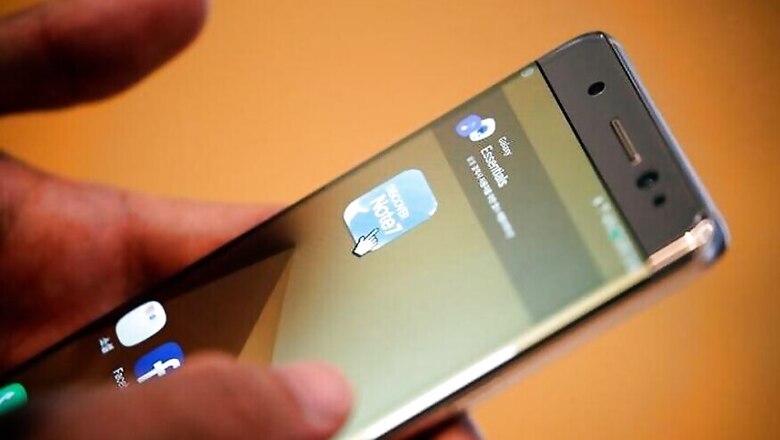
views
After the damaging recall of its fire-prone Note 7 smartphone, you could be forgiven for thinking Samsung Electronics Co Ltd would make a song and dance about battery safety in its new flagship phones, due to be launched in the United States on Wednesday.
But in the run-up to the launch, crucial to the South Korean technology giant winning back consumer confidence, its marketing effort so far makes little mention of safety.
"If you talk about safety, it presupposes a rationale for why, unconsciously, and they know this; and they also know the media will pick up that narrative," said Los Angeles-based Eric Schiffer, a brand strategy expert and chairman of Reputation Management Consultants.
"Highlighting the safety issue at this point will cause the other narrative to be recycled, so they have elected to suppress and hope."
Samsung declined to comment ahead of the launch.
To be sure, Samsung announced a comprehensive safety plan after concluding in January that faulty batteries from two suppliers caused some Note 7s to catch fire.
It now has an eight-point safety check protocol that includes x-raying the batteries. And, at the design level, phones have more room to properly house the battery. Such steps have been reflected in the S8's development, the company says.
Executives have said there will be no repeat of the Note 7 debacle, and one person familiar with the matter told Reuters the S8 launch was pushed back to ensure it is safe to use.
"The additional measures Samsung has taken should certainly improve battery safety and durability," said Lewis Larsen, president of Chicago-based battery technology consultancy Lattice Energy LLC. "These are most definitely not just cosmetic steps 'for show.'"
The company has also this month put a long-time mobile executive in charge of a new product quality improvement office, and affiliate Samsung SDI Co Ltd has invested 150 billion won ($135 million) on improving battery safety.
"NEEDLE IN A HAYSTACK"
Samsung recalled the Note 7 last September to replace faulty Samsung SDI batteries, but replacement batteries from Amperex Technology Ltd also proved faulty due to different problems - an embarrassment for a company that prides itself on product quality, analysts say. The Note 7 was eventually pulled from the market in October.
The company said earlier this week it plans to sell refurbished versions of the Note 7 smartphones, equipped with new batteries that have gone through new safety measures.
Downplaying the battery safety issue may also be a sensible marketing option as the new quality measures can't guarantee there will be no future problems. Any failure rate would likely be very low at first.
Samsung said last year it confirmed just 140 faulty batteries in more than 3 million Note 7s it sold - fewer than five in every 100,000.
"How confident are they that they can actually find a faulty cell with these additional checks," said Venkat Viswanathan, assistant professor at Carnegie Mellon and a battery technology expert. "It's sort of finding a needle in a haystack."
And safety is still on the minds of potential buyers of the new phone.
In one poll asking people what features they were looking forward to most in the S8, one Twitter user quipped: "A non exploding phone."
And at last week's annual shareholder meeting, one young boy stood up and asked Samsung to double down on safety. "In future, even if it takes time, I hope there will be no incidents like the Galaxy Note 7 explosions," he said.
Some analysts expect the S8, expected to go on sale next month, to outsell the Galaxy S7, which was Samsung's best seller in its first year from launch.
Others, though, say consumers may prefer to wait a few months before buying, just to be sure the new phones are safe.















Comments
0 comment